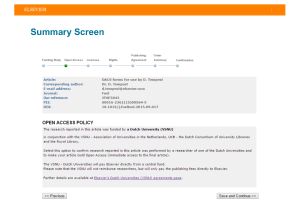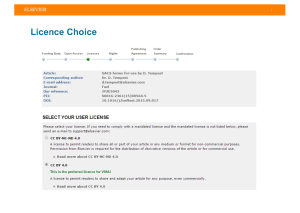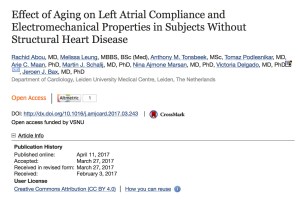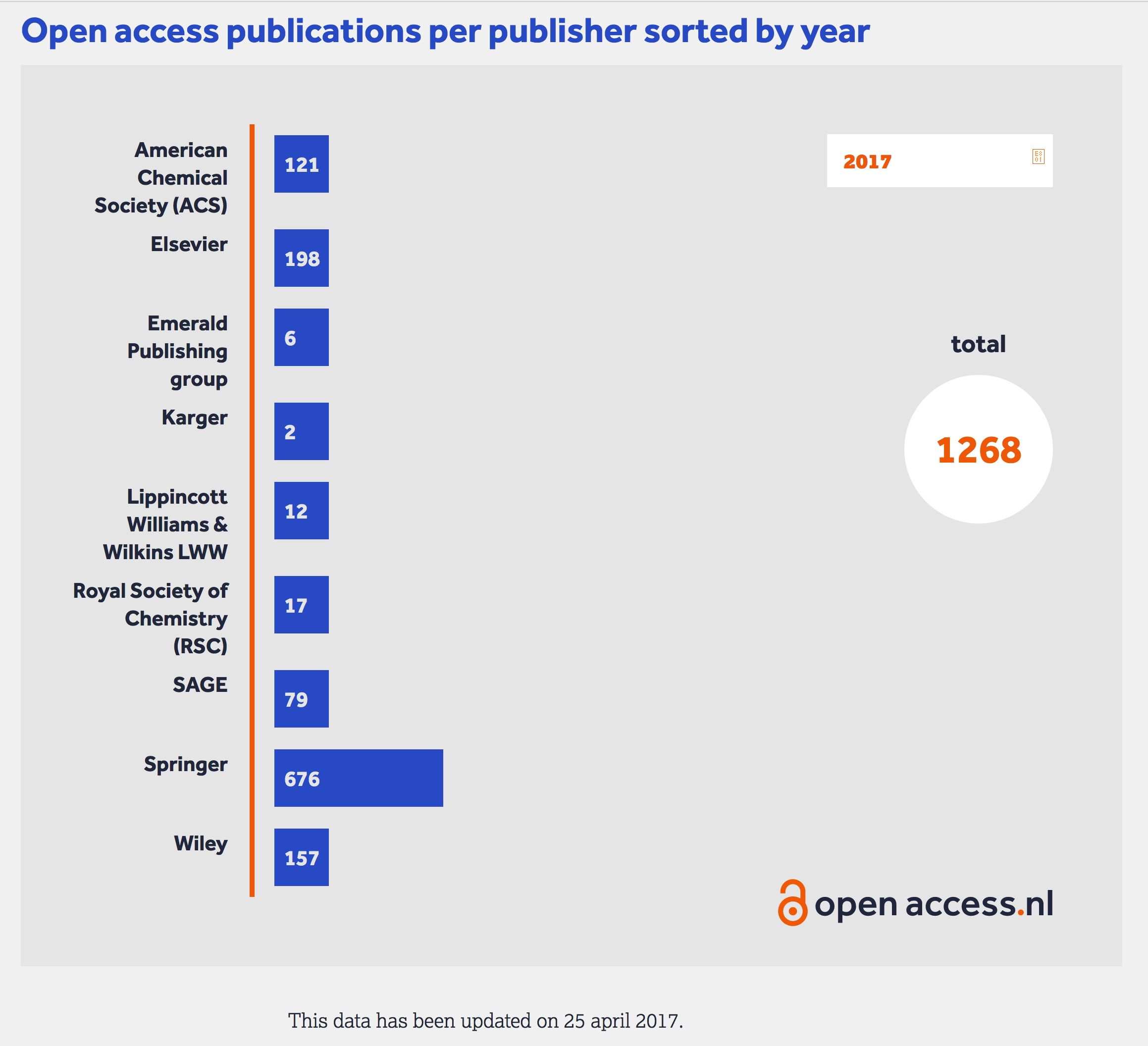Ende 2016 veröffentlichen die Niederländischen Universitäten ihre Subskriptionskosten an die grossen wissenschaftlichen Verlage. Auf eine weitere Anfrage gestützt auf das Niederländische Öffentlichkeitsgesetz haben die Universitäten nun gar die Verträge mit den grösseren Verlagen offengelegt. Diese sind wegen den weltweit einzigartigen Offsetting-Vereinbarungen besonders interessant. Durch harte Verhandlungen haben die Universitäten erreicht, dass neben dem Zugriff auf die Subskriptionsinhalte, die lokale Artikelproduktion automatisch durch die Verlage OA geschaltet wird.
Elsevier und Springer gegen Transparenz
Einzig Elsevier und Springer stimmten einer Veröffentlichung der Verträge nicht zu. Die Niederländischen Universitäten haben darauf hin ein Komitee zusammengesetzt, welche zur rechtlichen Situation eine Beurteilung vornahm. Das Komitee kam im Mai 2017 zum Schluss (Siehe Entscheide: Elsevier, Springer), dass die von den Verlagen vorgebrachten Argumente (Geschäftsgeheimnis und unverhältnissmässige Benachteiligung) das Interesse an Transparenz nicht zu überwiegen mögen. Diese Entscheide können von Elsevier und Springer noch gerichtlich angefochten werden. Derweil ist der Vertrag mit Elsevier bereits an scienceguide.nl geleaked worden.
OA Komponente in den Verträgen
Wie ein Blick in die Verträge zeigt, wurde die Forderung nach OA für die niederländische Artikelproduktion je nach Verlag unterschiedlich gelöst. Meist wurde jedoch im bisherigen Lizenzvertrag noch ein Abschnitt zu OA eingefügt:
Wiley
2. Agreement
Wiley agrees to the hybrid open access publication of accepted primary research material and review articles as requested by Corresponding Authors through a WOAA in consideration of the fee outlined in Appendix D and for no additional APC. This agreement will commence for articles accepted from [] February 2016 and end on 31st December 2019.
3. Wiley’s Obligations
In consideration of the payments listed in Appendix D and subject to the terms and conditions of this Agreement, Wiley shall during the Term of this Agreement:
- not charge a Corresponding Author an APC for any primary research material submitted by such Corresponding Author that is accepted for publication in Hybrid Open Access Journal and authorised by the Member Institution, provided the Corresponding Author submits said material according to the WOAA workflow put forward by Wiley. If a Corresponding Author requests Wiley to change the publication basis of his/her submission prior to publication, Wiley will do so; changes cannot be made post-publication. Any APC incurred outside the WOAA workflow is not covered by this Agreement;
- list the Member Institution on the Wiley’s Author Services site and in the hybrid open access order form as an Institutional Account Holder,
- provide a link from the entry for the Member Institution on the Institutional Account List on Wiley Online Library to the Member Institutions.
- identify on Wiley Online Library the articles that are available on an Open Access basis in the Hybrid Open Access Journals
- provide an annual report to Member Institutions within 4 months of the end of each calendar year of all articles (open access and otherwise) published by Corresponding Authors in the Hybrid Open Access Journals.
- provide access to each Member Institution to the Wiley Open Access Account Dashboard which allows the Member Institutions access to all article and transactional dntn related to their authors.
(Auszug von: http://vsnu.nl/files/documenten/Domeinen/Onderzoek/Open access/Wiley.pdf)
Elsevier
Pilot Gold Open Access
The Authorized Users of the Institutions shall have the right during the term of this Agreement to submit a total of 3,600 journal articles under the Pilot Gold Open Access for publication to Elsevier and, if accepted after peer review, to be published at no additional costs under the Pilot Gold Open Access after which the journal article shall be published under a CC-BY or CC-BY-NC-ND license as determined by the submitting Authorized User. Submitting Authorized Users under the Pilot Gold Open Access shall not be required to transfer any copyright in their work to Elsevier, instead submitting Authorized Users grant exclusive rights to Elsevier in the journal article publishing process. The submitting Authorized Users shall have the same rights to reuse the published journal article as those allowed to third party users of the journal article under the selected CC license.
The number of journals published by Elsevier which are available for the Pilot Gold Open Access are selected by Elsevier in agreement with the Subscriber and are based upon the domain and NL publishing behavior required to meet the respective quota as described above in Gold Open Access journal articles and attached in Schedule 1.2 of this Agreement. The additional number of Elsevier journals to be selected by Elsevier in agreement with the Subscriber for the subsequent year(s) will be determined by the number of articles published by the Authorized User under the Pilot Gold Open Access compared to the previous year and shall be listed in Schedule 1.2 of this Agreement by means of an amendment in writing to this Agreement.
Elsevier shall on a monthly basis provide Subscriber a report of the total number of Gold Open Access journal articles published under this Agreement. Elsevier will make available on a semiannual basis a complete report of all articles (open access and otherwise) published by Authorized Users.
In the event the number of journal articles under the Pilot Gold Open Access has not been reached during a particular calendar year such unused number of journal articles shall cany forward to the next calendar year, however unused journal articles will be forfeited upon termination of the term of this Agreement.
Elsevier will not levy article processing charges directly on Authorized Users of the Institutions in relation to the selected Journals under the Pilot Gold Open Access described herein. The aforementioned does not prejudice Elsevier’s right to charge article processing charges from submitting Authorized Users to the extent these fall outside the scope of selected journals under the Pilot Gold Open Access.
The Institutions shall ensure that Authorized Users who wish to submit article manuscripts shall identify themselves as being eligible in the course of Elsevier’s publishing work-flow.
(Auszug von: http://www.scienceguide.nl/media/1925623/oa_paragraph_elsevier_and_consortium.pdf)
Sage
Clause 17: Open access publishing
- Authors who are affiliated to the Institution and who qualify as eligible Authors according to the conditions set out in Attachment X are allowed to publish their articles in open access in the Hybrid Open Access Journals via Sage Choice at no costs to them.
- The applicable open access publishing terms and conditions are covered in Attachment X (‚Open Access Publishing“).
- Parties will agree to and evaluate relevant workflows and tools with regard to open access publishing.
- Eligible Authors may include and make available the final version (Publisher PDF version) in the institutional repository of the Institution and on the personal web pages of the employee concerned.
- Articles are made available under the Creative Commons Attribution License 3.0 or the Creative Commons Attribution Non-Commercial 3.0 License. Publisher will inform SURFmarket as soon as CC-BY version 4.0 has been implemented.
- Publisher will use its best efforts to work on providing an automated article upload service to designated repositories.
- Publisher will deliver a quarterly report to SURFmarket of the articles that have been published in Open Access in hybrid Journals. The report gives an overview of the corresponding authors(s), the affiliation of the corresponding author(s), the article title and Journal volume, per institute. The report will be delivered within 4 weeks after the end of each quarter.
- Publisher will use its best efforts to deliver to SURFmarket a full report of all articles (open access and otherwise) published by the Institutions over the period 1 January until 30 June and l July until 31 December. The report gives an overview of the Institutions, the corresponding author(s), the affiliation of the corresponding author(s), the article titles. Journal volumes and open access Y/N. The report is delivered within 4 weeks after the end of the 6 month periods.
- For journals running in the standard production workflow, Publisher will use Its best efforts to incorporate tags in meta-data to indicate If an article has been published in open access http://www.niso.org/news/pr/view?item_key=641bc3f6540b533afee9e7db9edebb6dd5b0ed81
- The Parties agree to and evaluate the business model, including the number of published articles. Six months before the Agreement automatically ends the parties agree to meet and compose a written evaluation report on the collaboration.
(Auszug von: http://vsnu.nl/files/documenten/Domeinen/Onderzoek/Open%20access/Sage.pdf)
De Gruyter
Clause 5: Open access publishing
- Authors who are affiliated to the Institution and who qualify as Eligible Authors according to the conditions set out in Attachment C-b are allowed to publish their articles in open access in the Open Access Journals at no costs to them.
- The applicable open access publishing terms and conditions are covered in Attachment C-b („Open Access Publishing“)
- Parties will agree to and evaluate relevant workflows and tools with regard to open access publishing
- Eligible Authors may include and make available the final version (Publisher PDF version) in the Institutional repository of the Institution and on the personal web pages of the employee concerned.
- Articles are made available under the Creative Commons Attribution License 4.0 or the Creative Commons Attribution Non-Commercial 4.0 License
- Publisher will work on providing an automated article upload service to a central, designated repository
- Publisher will deliver a monthly report per institute of the articles that have been published in Open Access in hybrid journals in each month. The report gives an overview of the corresponding author(s), the affiliation of the corresponding author(s), the article title and journal volume, per Institute. The report will be delivered within 4 weeks after the end of each month;
- Publisher will deliver a full report of all articles (open access and otherwise) published by the Institutions over the period 1 January until 30 June and 1 July until 31 December. The report gives an overview of the Institutions, the corresponding author(s), the affiliation of the corresponding author(s), the article titles, journal volumes and open access Y/N. The report is delivered within 4 weeks after the end of the 6 month periods.
- For Journals running in the standard production workflow, Publisher will incorporate tags in meta-data to indicate if an article has been published in open access http://www.nfais.org/index.php?option=com_content&view=article&id=140:niso-publishes-recommended-practice-on-metadata-indicators-for-accessibility-and-licensing-of-e-content&catid=23:industry-news&Itemid=113
- The Parties agree to and evaluate the business model, including the number of published articles. Six months before the Agreement automatically ends the parties agree to meet and compose a written evaluation report on the collaboration.
(Auszug von: http://vsnu.nl/files/documenten/Domeinen/Onderzoek/Open access/Walter de Gruyter.pdf)
Karger
Clause 5: Open access publishing
- Authors who are affilIated to the Institution and who qualify as Eligible Authors according to the conditions set out in Schedule C-b are-allowed to publish their articles-in open access in the Journals set out in Schedule C-a free of open access fees. Open Access fees are independent of any standard production charges that may apply during the production process.
- The applicable open access publishing terms and conditions are covered in Attachment x („Open Access Publishing“).
- Parties will agree to and evaluate relevant workflows and tools with regard to open access publishing.
- Eligible Authors may include and make available the final version (Publisher PDF version) in the institutional repository of the Institution and on the personal web pages of the employee concerned. Reposted Open Access articles must:
- Follow the terms of the relevant Creative Commons license
- Be linked to the final version on www.karger.com
- Include the following statement: ‘The final version of this article is available at http://www. karger:com/?doi={insert DOI}
- Articles are made available under the Creative Commons-Attribution-License CC-BY-NC-ND.
- Publisher will provide articles to Pubmed Central.
- Publisher will deliver to SURFmarket a monthly report per institute of the articles that have been published in Open Access in hybrid journals in each month. The report gives an overview of the corresponding author(s), the affiliation of the corresponding author(s), the article title and journal volume, per institute. The report will be delivered within 4 weeks after the end of each month.For journals running in the standard production workflow, Publisher will incorporate tags in meta-data to indicate if an article has been published in open access http://www.niso.org/news/pr/view?item_key=641bc3f6540b533afee9e7db9edebb6dd5b0ed81
- The Parties agree to and evaluate the business model, including the number of published articles. Six months before the Agreement automatically ends the parties agree to meet and compose a written evaluation report on the collaboration.
(Auszug von: http://vsnu.nl/files/documenten/Domeinen/Onderzoek/Open access/Karger.pdf)
Emerald
Open Access
- Subject matter
The parties now intend to combine these two collaboration formats (subscribing/licensing and open access publishing) as a pilot. This pilot will be contractually linked via this Schedule and its attachments („the Agreement“).
The parties make publishing in open access format, in a specified collection of established subscription journals with an Open Access option, (in the following „Open Access Journals“, see
Attachment 3) available to eligible authors that are affiliated to the Institute as described in
Attachment 2. In 2016,15 APC vouchers are available; In 2017 30 APC vouchers are available, In 2018, 45 APC vouchers are available. Unused access vouchers shall not be carried over into the following year(s). All articles eligible for APCs will be subject to the respective journal’s editorial and peer review processes.
The parties also agree to make Journal content available to the Institutes via a Publisher platform, currently http://www.emeraldinsight.com („the Licensed Material“, Attachment 3)
Furthermore the parties plan to evaluate the experiences of this combined availability of the points indicated above to explore future cooperation and a mutually sustainable model. To reach these agreed objectives, this Agreement consists of a publishing part (clause 2) and a platform part (clause 3).
- Open access publishinga) Terms and conditions of open access publishing
Authors who are affiliated to the Institute and who qualify as Eligible Authors according to the conditions set out in Attachment 2 are allowed to publish their articles as open access in the subscription journals at no financial cost to them. If the allocated vouchers expire before the year has ended, authors will need to pay the standard APC, subject to the acceptance of their article via the journal’s editorial and peer review processes.
The applicable open access publishing terms and conditions are covered in Attachment 2 („Open Access Publishing“).
If an article is accepted following full peer review, eligible authors may redeem an APC voucher (subject to availability). Articles published with an APC voucher will be published under the Creative Commons Attribution License 3.0 or (Creative Commons Attribution License 4.0 for some Emerald Publishing Services titles). Articles published under these licences will be hosted on http://www.emeraldinsightht.com and free of any paywall. Authors may deposit articles published under these licences on any webpage, subject to full attribution.
Authors not using tokens will be subject to Emerald’s Green Open Access policy as outlined on the Emerald Author rights page.
b) Terms and conditions of open access publishing
Publisher will report on a quarterly basis how many articles have been published via Open Access Publishing and send this report to the Institute.
Publisher will make available on a semi-annual basis a complete report of all articles (open access and otherwise) published by (corresponding) Authors which will enable the Institute to verify the correct Implementation of the Agreement.
For journals running in the standard production workflow, the Publisher will clearly indicate articles which have been published as Gold Open Access.
- Evaluation
The parties agree to and evaluate the pilot, including the number of published articles. Six months before the Agreement automatically ends the parties agree to meet end compose a written evaluation report on the collaboration.
Terms and Conditions for Open Access Publishing for Authors
- Eligible authors
Students enrolled or accredited to one of the institutions and the teaching and research staff employed by or otherwise accredited to one of the Institutions.
In case of articles published by multiple authors, the corresponding author will be the Eligible author. Corresponding author shall be the author who signs the publishing agreement.
Authors are only eligible once their article has been accepted following the Journal’s peer review and editorial processes, and they have completed an Emerald Open Access Licence. Currently this Licence refers to the Creative Commons Attribution License 3.0 or the Creative Commons Attribution I 4.0 License for some Emerald Publishing Services journals.
- Eligible Article Types
The following standards have to be met by the open access articles:
- Articles have to be original and not infringe on any law and/or third party right and meet ethical standards;
- Article types Include:
- General review
- Secondary article
- Research paper
- Literature review
- Case study
- Viewpoint Conceptual paper
- Technical paper
- Open Access Vouchers
Publisher and SURFmarket have agreed to issue 15 Open Access vouchers in 2016. In the license year 2017 this shall be upgraded to 30 vouchers and in the license year 2018 this will be 45 vouchers. Vouchers that have expired may not he used In successive years.
- The parties‘ obligations
The parties have the following obligations regarding the Open Access Publishing:
- Publisher shall not levy article processing charges directly on Authors who have Identified themselves and whose eligibility has been verified;
- Publisher shall alert authors to the availability of OA vouchers. Authors will be directed to contact their institutional library in order to request a voucher;
- The redemption of an APC voucher shall not influence the peer review process a. editorial decision(s), nor interfere with any of Emerald’s COPE-compliant ethics or submission guidelines;
- Institute shall ensure that Authors shall identify themselves as being eligible in the course of the Publisher publishing work-flow. In case authors have not identified themselves as being eligible, once an article has been published in a subscription Journal, or online-first or earlycited, the author is not eligible anymore to publish the article as Gold Open Access.
- Publisher shall provide email notifications to the Institutes each time an Author has Identified himself as eligible.
- Institute shall ensure that the Institutes confirm or deny the eligibility of the author. In case Publisher does net receive either a confirmation or a denial within 3 business days after Publisher has notified the Institute, Publisher shall deem the author to be eligible and continue the publishing process.
- The parties may change this identifying process and amend this Agreement accordingly by
- mutual consent and with an appropriate notice period.
(Auszug von: http://www.vsnu.nl/files/documenten/Domeinen/Onderzoek/Open%20access/Emerald.pdf)
Corresponding Authors von den teilnehmenden Hochschulen werden dadurch berechtigt, ohne zusätzliche Kosten oder mit einer stark reduzierten APC in den entsprechenden Hybrid-Programmen der Verlage und unter einer bestimmtem Creative Commons Lizenz zu publizieren. Zusätzlich verpflichten sich die Verlage den Hochschulen periodisch Bericht über die OA-Publikationen zu erstatten.
Desweiteren wird ein Gesamtpreis über alle Verlagsdienstleistungen vereinbart. Die spannende Frage wie man zu diesem Preis gekommen ist (also die eigentliche Preiskalkulation mit dem Offsetting) geht aus den Verträgen nicht im Detail hervor.
Preise
Eine Zusammenstellung der VSNU zeigt jedoch, dass bei den allermeisten Verlage die Preise auf dem Niveau der bisherigen Subskriptionsausgaben verbleiben und Preiserhöhungen im Bereich von 2-5 Prozent pro Jahr vorgesehen sind. Lediglich bei Karger und RSC ist der Anstieg der Kosten um 23% relativ hoch. Das mag vielleicht damit zusammenhängen, als die Niederländer im Wert weit mehr dort publizieren, als dass sie aktuell abonnieren.

Modalitäten für Forschende
Auf openaccess.nl wurde für niederländische AutorInnen eine Übersicht zu den neuen OA-Möglichkeiten geschaffen. Neben dem eher unpraktischen Voucher System (Emerald, RSC) bzw. APC-Waiver-Code (LWW) gibt es doch einige Verlage (Wiley, De Gruyter, Springer, Taylor & Francis), welche die Affiliation eines Autors erkennen und das Paper automatisch in ihrem Hybrid Programm publizieren. Teils hat der Autor dann noch die Möglichkeit eine CC-Lizenz seiner Wahl (meistens aber die von der OASAP empfohlenen CC-BY) zu bestimmen. Die Verrechnung der APC verläuft überall im Hintergrund.
Für die VSNU hat Elsevier den bestehenden Workflow für die Hybrid-Bezahlungen von Forschungsförderer angepasst:
-

-
Auswahl VSNU
-

-
Info über Agreement
-

-
Auswahl CC-Lizenz
-

-
Vermerk APC-Funding
Monitoring
Mit den meisten Hybrid-Verlagen hat die VSNU ein periodisches Reporting über die bezahlten OA Artikel vereinbart. Dieses wird auch auf auf openaccess.nl visuell zugänglich gemacht:

Neue Massstäbe
Die Niederländischen Verträge setzen klar neue Massstäbe. Wie bereits bei der SCOAP3-Spezifikation werden Verlage wieder korrekt als Dienstleister behandelt und die Hochschulen verstehen sich endlich als bestimmende Auftraggeber mit einer Verantwortung der Gesellschaft und der Wissenschaft gegenüber.
Man kann selbstverständlich die eingegangen Vereinbarungen als zu teuer oder als „System-unterstützend/verlängernd“ kritisieren. Doch wer das tut, der soll bitte auch Kritik an den Big Deals ausüben die anderswo (wie z.B. in der Schweiz) nachwievor ohne Berücksichtigung von OA still und heimlich abgeschlossen werden.
Kritik – Gold OA wird vernachlässigt
Unschön und deshalb zurecht am „Dutch Approach“ kritisitiert, bleibt jedoch der starke Fokus auf Hybrid, währenddessen (noch) keine durchgängige reine Gold OA-Finanzierung vorhanden ist. Nur wenige Universitäten (z.B. TU Delft und Utrecht) bieten finanzielle Unterstützung für das Publizieren in reinen OA-Journals an.
Überraschend hat zudem der wichtigste Niederländische Forschungsförderer NWO angekündigt, seine finanzielle Unterstüzung von Gold OA auf Ende 2017 einzustellen:
Currently there are many more opportunities for authors to make their publications available via open access channels without having to pay for publication costs. In part, this has been achieved through open access agreements between Dutch universities and publishers. In addition, there are a growing number of open access journals and platforms that do not charge publication costs. Finally, there is the green route, which authors can use to deposit their articles in a (university) repository at no cost.
Auf Nachfrage war zu erfahren, dass aus Sicht der NWO genügend Geld im System vorhanden sei und mit diesem Schritt die Universitäten aufgefordert werden ihre Bibliotheksbudgets hin zur Finanzierung von Gold OA umzuschichten.
Ob dieses Kalkül aufgeht und die Niederländischen Universitäten anfangen auch explizit Gold OA zu finanzieren wird sich zeigen. Auch wenn die Niederländer mit ihren Offsetting-Verträgen Grossartiges erreicht haben, kann nur Green mit Hybrid aber ohne Gold OA kaum die Lösung sein.
Update 2.7.2017
Der Vertrag der Niederländer mit Elsevier ist nun ganz offiziell öffentlich. Springer hat noch eine Fristverlängerung von 4 Wochen beantragt.
Update 3.7.2017
RSC teilt mir mit, die Preissteigerung von 22.8% sei darauf zurückzuführen, dass die TU Delft neu in das NL-Konsortium eingetreten ist. Ebenfalls sei man ab 2017 mit dem Read & Publish-Modell von der Verwendung von Vouchers weggekommen.
Update 12.7.2017
Springer hat die Veröffentlichung des Vertrages zugestimmt.







